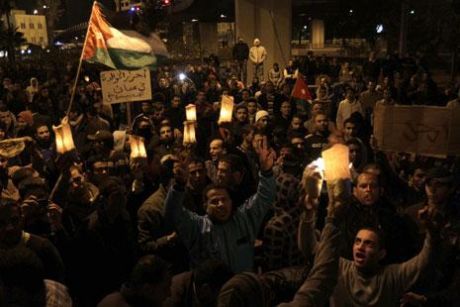News
You are here
Jordan: protests lead to revolution

November 14, 2012
Thousands gathered in Amman on November 13 protesting against the raise in fuel prices. The protest that started peaceful ended with civil disobedience the next day. Many trade unionists, workers and students announced a general strike.
While the majority of the protesters in Jordan demand reforms and an end to austerity measures, some of them have chanted the same slogan heard across the Arab Spring revolutions, “People demand the fall of the regime.” Economic inequality and poverty, and the inspiring resistance to it across the region, have ignited the first sparks of what might be anticipated as a possible revolution in Jordan.
Austerity and resistance
Most Jordanians use fuel in their domestic heating systems. Electrical heating systems are unaffordable for most Jordanians who only earn enough money to fulfill their basic needs. The decision to raise the fuel prices to 20 per cent means that winter will be very harsh for them. In addition, most families use fuel for cooking. Apparently, the government’s decision to alter the prices will only affect the working class with low wages, and those who already suffer from poverty and unemployment. Just like any capitalist regime, austerity measures target only ordinary people, while the ruling class and government loyalists are not affected.
Protesters occupied what’s known as Interior Roundabout or what’s officially called Jamal Abdulnaser Roundabout. They refuse to return to their homes if their demands are not met. Protesters are also seen in several cities in Jordan with similar demands. The state’s forces surrounded them and launched a tear gas attack. Forces are also using rubber bullets and live ammunition in the crackdown. There are reports that the electricity was cut off. Hundreds were arrested, but exact numbers are not confirmed yet. The protests that initially started against austerity also exposed the government’s corruption. Some of the protesters demanded the government stop sending Jordanian forces to the Gulf countries such as Bahrain. Knowing the deteriorating economic situation in Jordan, the government of Bahrain was successful in recruiting young unemployed Jordanians to their military. People in Jordan are disappointed to see their young ones attacking others in Gulf countries.
Democracy and imperialism
Several mass protests have been organized in the past two years, but so far the recent protests are the most prominent. Early parliamentary elections are scheduled for January 23, 2013. Opposition parties, trade unionists and leftists are planning to boycott the elections because the electoral system remains in favor of the king’s traditional Bedouin loyalists. Despite the support of the tribes’ elder leaders to the monarchy, many young Bedouins are joining the united front.
Any change towards democracy in Jordan will threaten the monarchies in the Gulf. The Jordanian government has been very loyal to the West. On October, the United States sent military troops to Jordan to bolster its military capabilities and be prepared for any “humanitarian intervention” in Syria. Jordanians now are in the midst of a battle against austerity, lack of democracy and imperialism.
Section:
- Log in to post comments









